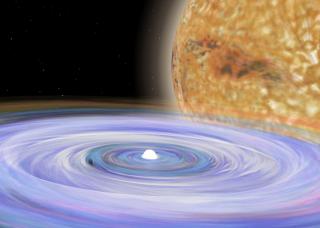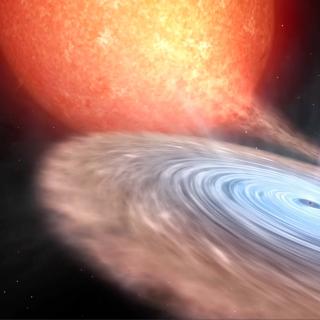Bibcode
McAllister, M. J.; Littlefair, S. P.; Dhillon, V. S.; Marsh, T. R.; Ashley, R. P.; Bours, M. C. P.; Breedt, E.; Hardy, L. K.; Hermes, J. J.; Kengkriangkrai, S.; Kerry, P.; Rattanasoon, S.; Sahman, D. I.
Bibliographical reference
Monthly Notices of the Royal Astronomical Society, Volume 464, Issue 2, p.1353-1364
Advertised on:
1
2017
Citations
21
Refereed citations
20
Description
The majority of cataclysmic variable (CV) stars contain a stochastic
noise component in their light curves, commonly referred to as
flickering. This can significantly affect the morphology of CV eclipses
and increases the difficulty in obtaining accurate system parameters
with reliable errors through eclipse modelling. Here we introduce a new
approach to eclipse modelling, which models CV flickering with the help
of Gaussian processes (GPs). A parametrized eclipse model - with an
additional GP component - is simultaneously fitted to eight eclipses of
the dwarf nova ASASSN-14ag and system parameters determined. We obtain a
mass ratio q = 0.149 ± 0.016 and inclination i =
83.4°^{+0.9°}_{-0.6°}. The white dwarf and donor masses were
found to be Mw = 0.63 ± 0.04 M⊙ and
Md = 0.093 ^{+0.015}_{-0.012} M⊙,
respectively. A white dwarf temperature Tw = 14 000
^{+2200}_{-2000} K and distance d = 146 ^{+24}_{-20} pc were determined
through multicolour photometry. We find GPs to be an effective way of
modelling flickering in CV light curves and plan to use this new eclipse
modelling approach going forward.
Related projects

Binary Stars
The study of binary stars is essential to stellar astrophysics. A large number of stars form and evolve within binary systems. Therefore, their study is fundamental to understand stellar and galactic evolution. Particularly relevant is that binary systems are still the best source of precise stellar mass and radius measurements. Research lines
Pablo
Rodríguez Gil

Black holes, neutron stars, white dwarfs and their local environment
Accreting black-holes and neutron stars in X-ray binaries provide an ideal laboratory for exploring the physics of compact objects, yielding not only confirmation of the existence of stellar mass black holes via dynamical mass measurements, but also the best opportunity for probing high-gravity environments and the physics of accretion; the most
Montserrat
Armas Padilla